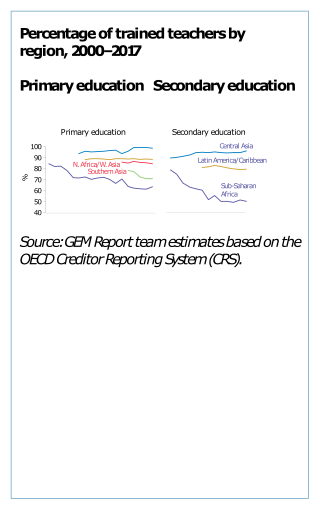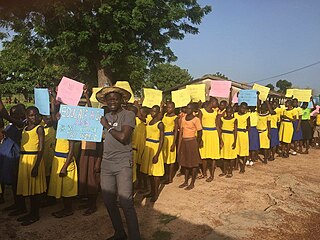
Pedagogy, most commonly understood as the approach to teaching, is the theory and practice of learning, and how this process influences, and is influenced by, the social, political, and psychological development of learners. Pedagogy, taken as an academic discipline, is the study of how knowledge and skills are imparted in an educational context, and it considers the interactions that take place during learning. Both the theory and practice of pedagogy vary greatly as they reflect different social, political, and cultural contexts.
Special education is the practice of educating students in a way that accommodates their individual differences, disabilities, and special needs. This involves the individually planned and systematically monitored arrangement of teaching procedures, adapted equipment and materials, and accessible settings. These interventions are designed to help individuals with special needs achieve a higher level of personal self-sufficiency and success in school and in their community, which may not be available if the student were only given access to a typical classroom education.
An Individualized Education Program (IEP) is a legal document under United States law that is developed for each public school child in the U.S. who needs special education. It is created through a team of the child's parent(s), the student and district personnel who are knowledgeable about the child's needs. IEPs must be reviewed every year to keep track of the child's educational progress.
Helena Trafford Devereux was an American educator who founded the Devereux Foundation. She is considered a pioneer in the field of special education.
Universal Design for Learning (UDL) is an educational framework based on research in the learning theory, including cognitive neuroscience, that guides the development of flexible learning environments and learning spaces that can accommodate individual learning differences.

Mainstreaming, in the context of education, is the practice of placing students with special education needs in a general education classroom during specific time periods based on their skills. This means students who are a part of the special education classroom will join the regular education classroom at certain times which are fitting for the special education student. These students may attend art or physical education in the regular education classrooms. Sometimes these students will attend math and science in a separate classroom, but attend English in a general education classroom. Schools that practice mainstreaming believe that students with special needs who cannot function in a general education classroom to a certain extent belong in the special education environment.

Teacher education or teacher training refers to programs, policies, procedures, and provision designed to equip (prospective) teachers with the knowledge, attitudes, behaviors, approaches, methodologies and skills they require to perform their tasks effectively in the classroom, school, and wider community. The professionals who engage in training the prospective teachers are called teacher educators.

Inclusion in education refers to including all students to equal access to equal opportunities of education and learning, and is distinct from educational equality or educational equity. It arose in the context of special education with an individualized education program or 504 plan, and is built on the notion that it is more effective for students with special needs to have the said mixed experience for them to be more successful in social interactions leading to further success in life. The philosophy behind the implementation of the inclusion model does not prioritize, but still provides for the utilization of special classrooms and special schools for the education of students with disabilities. Inclusive education models are brought into force by educational administrators with the intention of moving away from seclusion models of special education to the fullest extent practical, the idea being that it is to the social benefit of general education students and special education students alike, with the more able students serving as peer models and those less able serving as motivation for general education students to learn empathy.
Special education in the United States enables students with exceptional learning needs to access resources through special education programs. These programs did not always exist. "The idea of excluding students with any disability from public school education can be traced back to 1893, when the Massachusetts Supreme Court expelled a student merely due to poor academic ability". This exclusion would be the basis of education for all individuals with special needs for years to come. In 1954, Brown v. Board of Education sparked the belief that the right to a public education applies to all individuals regardless of race, gender, or disability. Finally, special education programs in the United States were made mandatory in 1975 when the United States Congress passed the Education for All Handicapped Children Act (EAHCA) "(sometimes referred to using the acronyms EAHCA or EHA, or Public Law 94-142) was enacted by the United States Congress in 1975, in response to discriminatory treatment by public educational agencies against students with disabilities." The EAHCA was later modified to strengthen protections to students with disabilities and renamed the Individuals with Disabilities Education Act (IDEA). IDEA requires states to provide special education and related services consistent with federal standards as a condition of receiving federal funds.
In the United States, the Individuals with Disabilities Education Act (IDEA) is a special education law that mandates regulation for students with disabilities to protect their rights as students and the rights of their parents. The IDEA requires that all students receive a Free and Appropriate Public Education (FAPE), and that these students should be educated in the least restrictive environment (LRE). To determine what an appropriate setting is for a student, an Individualized Education Plan (IEP) team will review the student's strengths, weaknesses, and needs, and consider the educational benefits from placement in any particular educational setting. By law the team is required to include the student's parent or guardian, a general education teacher, a special education teacher, a representative of the local education agency, someone to interpret evaluation results and, if appropriate, the student. It is the IEP team's responsibility to determine what environment is the LRE for any given student with disabilities, which varies between every student. The goal of an IEP is to create the LRE for that student to learn in. For some students, mainstream inclusion in a standard classroom may be an appropriate setting whereas other students may need to be in a special education classroom full time, but many students fall somewhere within this spectrum. Students may also require supplementary aids and services to achieve educational goals while being placed in a classroom with students without disabilities, these resources are provided as needed. The LRE for a student is less of a physical location, and more of a concept to ensure that the student is receiving the services that they need to be successful.
Karen R. Harris is an American educational psychologist and special educator who has researched the development of learning strategies and self-regulation among students with learning challenges such as learning disabilities and attention deficit hyperactivity disorder. She is currently the Mary Emily Warner Professor in the Division of Educational Leadership and Innovation, Mary Lou Fulton Teachers College at Arizona State University.
English-language learner is a term used in some English-speaking countries such as the United States and Canada to describe a person who is learning the English language and has a native language that is not English. Some educational advocates, especially in the United States, classify these students as non-native English speakers or emergent bilinguals. Various other terms are also used to refer to students who are not proficient in English, such as English as a second language (ESL), English as an additional language (EAL), limited English proficient (LEP), culturally and linguistically diverse (CLD), non-native English speaker, bilingual students, heritage language, emergent bilingual, and language-minority students. The legal term that is used in federal legislation is 'limited English proficient'.

Learning disability, learning disorder, or learning difficulty is a condition in the brain that causes difficulties comprehending or processing information and can be caused by several different factors. Given the "difficulty learning in a typical manner", this does not exclude the ability to learn in a different manner. Therefore, some people can be more accurately described as having a "learning difference", thus avoiding any misconception of being disabled with a possible lack of an ability to learn and possible negative stereotyping. In the United Kingdom, the term "learning disability" generally refers to an intellectual disability, while conditions such as dyslexia and dyspraxia are usually referred to as "learning difficulties".
The term twice exceptional, often abbreviated as 2e, entered educators' lexicons in the mid-1990s and refers to gifted students who have some form of learning or developmental disability. These students are considered exceptional both because of their giftedness and because they are disabled or neurodivergent. Ronksley-Pavia (2015) presents a conceptual model of the co-occurrence of disability and giftedness.
A resource room is a type of support for students with disabilities in need of special education that allows them to be leave their general education classroom placement and go to another location for targeted instructional support. It is one of many support options for special education students around the world to help meet their needs and serves as a transition stage between a self-contained classroom and a general education classroom for special education students. In the resource room, students work with a special education teacher or aide in either a small group or individual instruction.
Gwendolyn Cartledge is professor in the School of Physical Activity and Educational Services at the Ohio State University, specializing in methods for teaching social skills to children with and without disabilities ). Her primary responsibilities include teacher education for students with mild disabilities on. Her research and writings are recognized and cited nationally in teacher preparation programs. She has written several books and articles on these topics.
Deaf Education in Kenya is a constantly changing section of the Kenyan education system that is focused on educating deaf, hard-of-hearing, and hearing-impaired Kenyan students. There are many organizations in Kenya made to protect the rights of Deaf Kenyans and promote progress in deaf education. The state of Kenyan deaf education is constantly changing and improving.
Disability studies in education (DSE) is a field of academic study concerned with education research and practice related to disability. DSE scholars promote an understanding of disability from a social model of disability perspective to "challenge social, medical, and psychological models of disability as they relate to education". A DSE perspective situates disability within social and political context and is concerned with the civil and human rights of students with disabilities, including issues of equity, access, and inclusion in educational settings, curricula, and activities.
Inclusive Classroom is a term used within American pedagogy to describe a classroom in which all students, irrespective of their abilities or skills, are welcomed holistically. It is built on the notion that being in a non-segregated classroom will better prepare special-needs students for later life. In the United States, the Rehabilitation Act of 1973 guaranteed civil rights to disabled people, though inclusion of disabled students progressed slowly until the No Child Left Behind Act of 2001, after which almost half of US students with disabilities were soon in general classrooms.
Carol McDonald Connor was an educational psychologist known for her research contributions to the field of early literacy development in diverse learners, in particular for work on individualized student instruction interventions and the lattice model of reading development. She held the position of Chancellor's Faculty and Equity Advisor in the School of Education at the University of California, Irvine.





